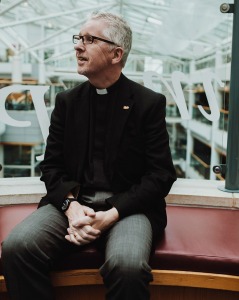Matthew 24.9-13
On March 7, the Church remembers Perpetua, Felicity, and their Companions, perhaps not widely known saints of God, but whose courage in adversity was in important factor in the life of the early Church.
Perpetua was a young, married noblewoman of Carthage and Felicity was her personal slave. Along with a small group of companions, they were arrested by the Roman authorities. When in prison, Perpetua had a vision in which she climbed a great ladder into paradise.
They were condemned as Christians and sent to the public arena for execution. All survived the mauling by wild animals, and so were killed by the sword. Before their deaths, they exchanged the kiss of peace and affirmed their faith in Christ, the Son of God.
The story of what happened circulated widely in secret throughout the Christian congregations, encouraging their fellow Christians in the face of suffering and adversity. They were martyred for their faith on this day in the year 203.’
The courage of these early followers of Jesus Christ is astonishing, as is the courage of the countless Christians who have suffered and died for their faith in the past two thousand years. Sadly, Christians continue to die as martyrs in countries across the world, rather than deny their Lord.
We should not be surprised. Jesus himself told his followers to expect persecution in his name, saying: ‘They will hand you over to be tortured and will put you to death, and you will be hated by all nations because of my name . . . But the one who endures to the end will be saved’ (Matthew 24.9-13).
Nevertheless, it is a disturbing and challenging thought for all who live the Christian life. God’s love for us is freely given and unconditional, but the responsibility is then ours to live out our lives according to the values of the kingdom that was ushered in by Jesus Christ.
Such values will sometimes conflict with the values of the world, requiring us to stand up for them and face the consequences. Thankfully we’ll not be thrown to wild beasts or killed with the sword like Perpetua, Felicity, and their Companions, though there will be a price to pay.
Standing up for our faith will bear a cost. Misunderstanding, ridicule, prejudice are just some of the negative responses we might face from others for holding our ground. There will be occasions when it seems as though we are swimming against the tide of popular opinion because of the choices we make.
When such times come, don’t be discouraged. Instead draw strength from the example of all those who have gone before us, and especially from the martyrs. For nothing can separate us from God’s love, not even the very worst that the world can throw at us. Following the example of Perpetua, Felicity, and their Companions, may we find courage in adversity.
